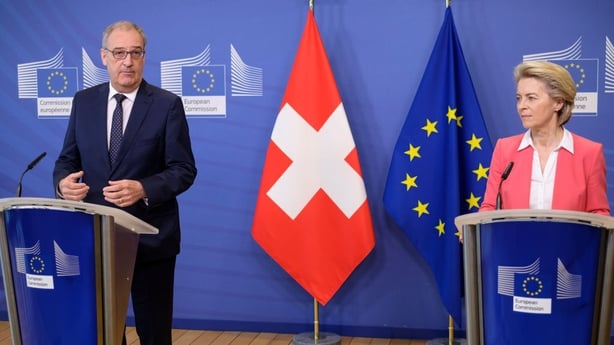Switzerland has pulled out of negotiations with the European Union over a treaty that would have replaced more than 100 bilateral agreements that have linked both sides since the early 1970s.
Bern made the announcement amid domestic opposition to a new deal, saying that substantial differences remained on key aspects of the treaty.
"The conditions are thus not met for the signing of the agreement," the Swiss government said after a cabinet meeting to plan the way forward in the long-running impasse with Brussels.
In a statement the European Commission said: "The Federal Council [Swiss government] took the decision to terminate the negotiations of the EU-Swiss Institutional Framework Agreement.
"We take note of this unilateral decision of the Swiss Government. We regret this decision, given the progress that has been made over the last years to make the Institutional Framework Agreement a reality."
Negotiations have been under way since 2018 to conclude a new treaty that would replace a series of bilateral arrangements which the EU has been keen to update and simplify.
Those arrangements were expanded after 1992, when Swiss voters rejected membership of the European Economic Area (EEA), which combines the EU with the European Free Trade Association (EFTA).
Switzerland has remained a de facto member of the single market, however, as it applies the vast bulk of EU rules.
However, walking away from a new treaty could over time disrupt and ultimately jeopardise Switzerland's de facto membership.
Failure to clinch the treaty, whose draft emerged in 2018, blocks Switzerland from any new access to the single market, such as an electricity union.
Existing accords will also erode over time, such as an agreement on cross-border trade in medical technology products that lapsed this week.
The European Commission said: "The EU-Swiss Institutional Framework Agreement was intended as the foundation to enhance and develop EU-Swiss bilateral relations for the future.
"Its core purpose was to ensure that anyone operating in the EU Single Market, to which Switzerland has significant access, faces the same conditions. That is fundamentally a matter of fairness and legal certainty. Privileged access to the Single Market must mean abiding by the same rules and obligations."

Trouble became apparent last month, when talks at a summit ran aground and Swiss President Guy Parmelin cited "fundamental differences" that remained.
Critics across the Swiss political spectrum say the pact infringed the country's sovereignty to an unacceptable extent.
For its part, the 27-member EU wants an overarching treaty to bind non-EU member Switzerland more closely to single market rules, including free movement of people, and provide a more effective way to resolve disputes.
A statement issued by the Swiss Mission to the EU said: "The Federal Council nevertheless considers it to be in the shared interest of Switzerland and the EU to safeguard their well-established cooperation and to systematically maintain the agreements already in force. It therefore wishes to launch a political dialogue with the EU on continued cooperation."
It said differences remained on the EU's Citizens' Rights Directive (CRD), wage protection and state aid provisions.
Switzerland had sought exemptions from the CRD to ensure that rights for EU citizens to enjoy freedom of movement in Switzerland were not extended.
"The impact of this could include higher social security costs. Adopting the CRD in its entirety would effectively constitute a paradigm shift in Switzerland's migration policy - a policy which enjoys wide support among the Swiss population and cantons," the statement added.
Additional reporting Reuters







